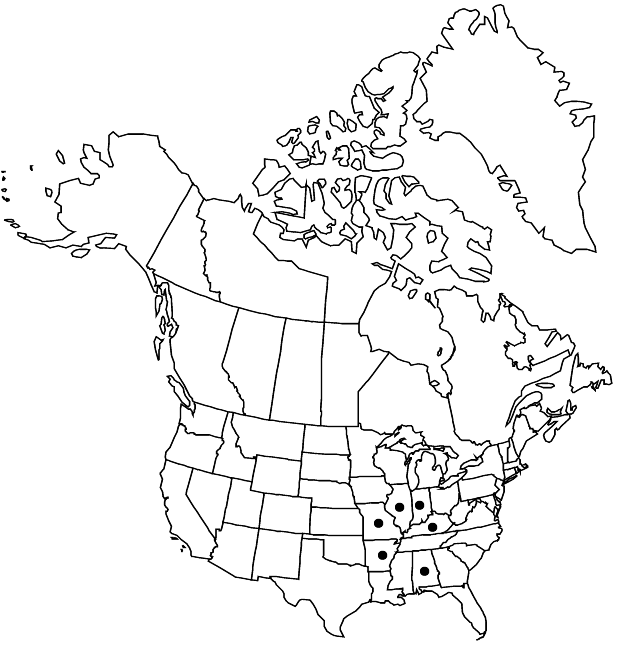Difference between revisions of "Dodecatheon frenchii"
Fl. Plains N. Amer., 626. 1932 ,.
FNA>Volume Importer |
FNA>Volume Importer |
(No difference)
| |
Revision as of 20:29, 24 September 2019
Plants 20–40(–60) cm; scape glabrous, rarely glandular-pubescent. Caudices not obvious at anthesis; roots white; bulblets absent. Leaves 10–30 × 4–8(–10) cm; petiole slender (at least basally); blade (not suffused with red at base), spatulate to ovate or broadly oval, base slightly decurrent onto stem, abruptly tapering to petiole, margins usually entire, surfaces usually glabrous, rarely minutely glandular. Inflorescences 2–15-flowered; bracts lanceolate, 3–10 mm, glabrous, rarely glandular-pubescent. Pedicels 1–5 cm, usually glabrous, rarely glandular-pubescent. Flowers: calyx light green, 3–8 mm, glabrous, tube 2–2.5 mm, lobes 5, 3–6 mm; corolla tube maroon and yellow with maroon, thin, wavy ring, lobes 5, white, sometimes pale rose or lavender to (rarely) magenta, 10–20 mm; filaments distinct and 0.8–1.2 mm or connate and tube yellow, 0.8–1.2 × 1.2–1.8 mm; anthers 5–7.5 mm; pollen sacs yellow, rarely speckled with red or maroon, connective purple, dark maroon, or black, smooth; stigma not enlarged compared to style. Capsules reddish brown, valvate, cylindric-ovoid, 6–10 × 3.5–5 mm, glabrous; walls thick, firm. Seeds without membrane along edges. 2n = 44.
Phenology: Flowering spring.
Habitat: Moist, shaded flats under sandstone cliffs and overhanging ledges along or near streams
Elevation: 100-300 m
Distribution

Ala., Ark., Ill., Ind., Ky., Mo.
Discussion
Dodecatheon frenchii is relatively rare throughout its restricted range in southern Illinois (Jackson, Johnson, Pope, Saline, Union, and Williamson counties), southern Indiana (Crawford and Perry counties), and western Kentucky (Breckinridge, Carter, Crittenden, Edmonson, Hardin, Menifee, Todd, Union, and Warren counties), with additional outlying populations in Colbert County, Alabama, Cleburne and Newton counties, Arkansas, and at Hickory Canyons Natural Area in Sainte Genevieve County, Missouri. The mature leaves nearly always have a distinctive cordate base.
Selected References
None.